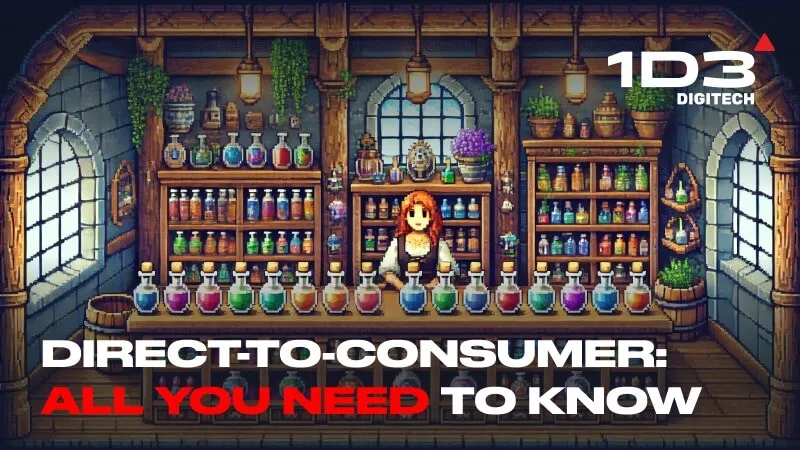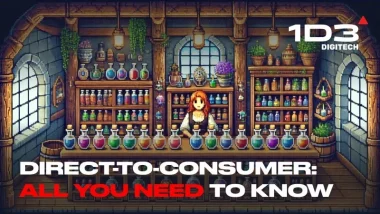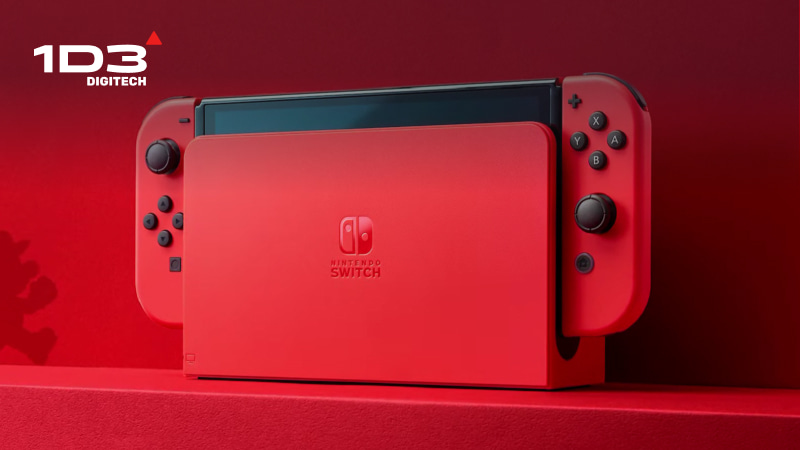The direct-to-consumer (DTC) model is reshaping how game developers connect with their audiences. This guide provides an in-depth understanding of DTC distribution, its application in video games and other industries, real-world examples and how a merchant of record (MoR) like 1D3 can help you succeed.
Direct-to-Consumer Distribution: Definition
Direct-to-consumer (DTC), also known as D2C, is a business model where products and services are sold directly from the producer to the end consumer without the involvement of third-party retailers or other intermediaries. This approach gives developers more control over the distribution process, including pricing, branding and customer relationships.
DIRECT-TO-CONSUMER DISTRIBUTION FOR GAMES AND DIGITAL PRODUCTS
GET IN TOUCH WITH 1D3The DTC model is increasingly popular in physical and digital products, offering greater profitability and closer customer connections. In the case of videogames, D2C distribution is getting even more traction as it allows game developers and publishers to bypass 30% platform commissions and significantly increase profit margins.
Direct-to-Consumer Approach Across Different Industries
D2C distribution proved to be successful across several industries. Let’s look at a couple of examples before we dive into videogames.
Direct-to-Consumer Steaks
Though farming is often seen as a traditional industry, adopting direct-to-consumer (DTC) models has proven to be transformative for some companies. ButcherBox is a prime example of how leveraging DTC strategies can drive substantial growth.
By 2023, ButcherBox surpassed $600 million in annual revenue, reflecting the strong demand for high-quality, sustainably sourced meat. The shift to DTC allowed the company to connect directly with customers, providing transparency, convenience, and a subscription model that built a loyal customer base. Their success demonstrates how embracing DTC models can help companies meet consumer needs, retain new customers, and sustain impressive growth even during challenging times.
Direct-to-consumer Golf Clubs
Golf is the second most expensive popular sport globally, mainly due to high equipment costs. BombTech Golf has successfully tackled this issue by adopting a direct-to-consumer (DTC) model, selling exclusively through their own website. This approach allows them to reduce costs and offer competitive prices by eliminating intermediaries.
BombTech Golf
Since 2012, BombTech has sold over 789,000 golf clubs, generating approximately $15 million in revenue. Their DTC model helps maintain profitability and affordability, with a monthly revenue of around $418,000 and a 1.5-2.0% conversion rate.
Using targeted social media advertising, BombTech efficiently acquires customers, leading to high conversion and low return rates. This DTC model has also contributed to high customer satisfaction, evidenced by over 19,850 five-star reviews, highlighting the value for money and transparency in their offerings.
Direct-to-consumer bikes
As Peloton demonstrated, a direct-to-consumer (DTC) approach can be highly effective for selling services that combine physical and digital products.
Peloton bikes
Peloton has leveraged the DTC model to offer a unique combination of interactive fitness equipment and digital subscriptions, allowing them to control pricing and customer experience and build a loyal community. Peloton eliminates intermediaries by selling directly through their platform, ensuring a consistent brand message and seamless customer journey from purchase to use. The DTC approach also allows Peloton to gather direct customer feedback, enabling swift improvements and tailored offerings that resonate with their audience.
In 2022, Peloton generated $3.58 billion in revenue, declining to $2.79 billion in 2023 as demand waned. Their DTC strategy also integrates hardware with subscription services, creating a cohesive fitness ecosystem. This helps them maintain engagement, with 6.3 million active members and a retention rate of 92%.
Peloton's direct relationship with customers results in a high level of brand loyalty, with members averaging over 15 workouts per month. This illustrates how their DTC model drives sustained engagement and long-term brand success.
D2C Video Game Distribution
In the context of video games, direct-to-consumer distribution means that game developers sell their games directly to players without using third-party storefronts like Steam, Google Play, App Store, Xbox Store or PlayStation Store. This model allows game studios to have more control over how their games are sold, to create unique marketing strategies, and to retain a higher percentage of the sales revenue.
In many cases, developers distribute their games through their own websites or proprietary platforms, which enables them to offer exclusive content, special promotions, and community-building features that aren't possible through third-party platforms.
Pros and Cons
Pros:
- Greater Control: Developers can control the pricing, branding, and promotion of their games, leading to a more tailored player experience.
- Higher Profit Margins: Eliminating intermediaries allows developers to retain a greater share of revenue from each sale.
- Direct Relationship with Players: Developers have direct access to their players, allowing them to gather feedback, build loyalty, and improve the overall gaming experience.
Cons:
- Customer Support and Data Security: Handling customer support and ensuring data privacy are additional responsibilities that developers must take on with DTC distribution.
- Complexity of Operations: Managing sales, customer support, payments, and taxes globally can be challenging without an experienced partner.
- Limited Reach: Without the established audience of third-party platforms, developers may face challenges in reaching a wide audience.
Direct-to-Consumer Video Game Distribution: Well-Known Cases
Battlestate Games and Escape from Tarkov
Battlestate Games has leveraged a direct-to-consumer (DTC) model to distribute Escape from Tarkov through its website. This approach allows them to control access, offer pre-orders, and sell different editions directly to players, maintaining full authority over pricing and exclusive content.
In 2020, the company generated around $50 million in revenue, benefiting from their independent distribution strategy. As of 2024, the average daily player count for Escape from Tarkov was approximately 583,252, reflecting strong engagement and a loyal player base. During peak events, the game has even seen over 200,000 concurrent players online, highlighting the success of their community-focused approach.
Blizzard Entertainment and World of Warcraft
Blizzard Entertainment's direct-to-consumer (DTC) model for World of Warcraft, distributed through Battle.net, has significantly contributed to their success. In 2022, Blizzard Entertainment generated $7.53 billion in revenue, with World of Warcraft contributing strongly due to expansions like "Wrath of the Lich King Classic" and "Dragonflight," which saw year-over-year growth in reach, engagement, and net bookings.
Blizzard's DTC strategy also includes subscription services and digital in-game items, which foster long-term player loyalty and drive engagement among millions of monthly active users globally.
Epic Games and Fortnite
Epic Games has achieved remarkable success with a direct-to-consumer (DTC) strategy, primarily distributing Fortnite through its website and launcher, allowing it to bypass third-party stores, retain control over monetization, and avoid platform fees. In 2022, Fortnite generated $4.4 billion in revenue, representing around 85% of Epic Games' total revenue. Since its launch, Fortnite has accumulated over $20 billion in lifetime revenue and attracted approximately 650 million registered users as of 2024. The game also boasts 250 million average monthly active players, with daily active users reaching up to 25 million at times, highlighting the success of their community and engagement strategies.
By keeping distribution in-house, Epic Games has maintained full control over pricing and optimized player engagement through exclusive content, special in-game events, and a wide range of customization options, further solidifying Fortnite's dominant position in the gaming industry.
The Role of Merchant of Record Companies in DTC Video Game Distribution
A Merchant of Record (MoR) like 1D3 is crucial in managing transactions and regulatory complexities for game developers in the direct-to-consumer (DTC) model. This allows developers to focus on creating quality games while the MoR handles the following key aspects:
- Global Payment Processing: The MoR manages payments from customers worldwide, accepting multiple payment methods such as credit cards, PayPal, and local options. It also handles transactions in different currencies, offering a seamless payment experience that improves conversion rates.
- Tax Compliance: One of the biggest challenges in DTC sales is managing tax obligations, which vary greatly across regions. An MoR like 1D3 calculates, collects, and remits sales tax, VAT, and other consumption taxes. This ensures compliance with local regulations and reduces developers' non-compliance risks.
- Data Security, Consumer Protection, and Chargeback Management: Handling financial transactions involves adherence to strict security standards, including encryption and compliance with regulations like GDPR. An MoR ensures secure, compliant transactions and manages sensitive data responsibly. Additionally, the MoR handles chargeback management, which helps mitigate fraudulent transactions and protects both developers and customers from unauthorized charges.
- Customer Support: The MoR also provides customer support for all payment-related issues, including billing inquiries, refunds, and payment troubleshooting. This offloads the burden of support from developers, allowing them to focus on their core product while ensuring a positive experience for customers.
By partnering with an MoR like 1D3, game developers can focus on game development while avoiding the complexities of financial management, global tax compliance, data security, chargeback management, and customer support. This allows them to deliver better games while trusting the MoR to handle all aspects of the transaction process effectively.
The Future of Direct-to-Consumer Video Game Distribution
The future of direct-to-consumer (DTC) video game distribution is promising, especially as new regulations like the Digital Markets Act (DMA) create opportunities for developers to bypass major digital platforms and take control of their distribution channels. Indie developers, in particular, are expected to adopt the DTC model to maximize their revenue and build stronger connections with their players. We are also likely to see a rise in direct subscription services, allowing developers to provide exclusive content and ongoing updates without third-party involvement. The focus will increasingly be on community-driven platforms that facilitate direct engagement between developers and players, creating a loyal user base.
START YOUR D2C JOURNEY NOW
GET IN TOUCH WITH 1D3Merchant of Record (MoR) companies like 1D3 will be crucial in supporting developers in this transition. As developers shift to DTC distribution, they must navigate global payment processing, tax compliance, and data security — areas where MoRs provide expertise and support. By managing these complexities, MoRs enable developers to focus on creating quality games while retaining control over pricing, monetization, and customer relationships. With regulatory changes like the DMA leveling the playing field, the DTC model is an exciting opportunity for developers to create more engaging and direct connections with their audiences.








